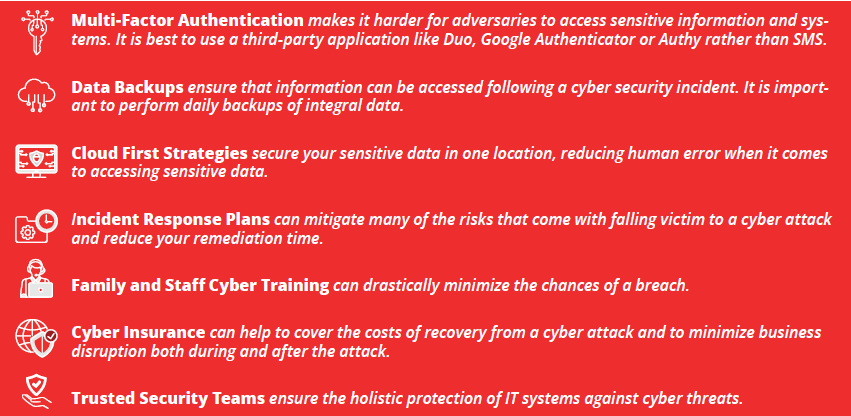Articles & Alerts
Cyber Criminals Are Targeting High Net Worth Clients, Family Offices and Corporate Executives – What Can You Do to Protect Yourself?
High Net Worth Individuals (HNWIs) and family offices have always been lucrative targets for cyber criminals, as they tend to have high-value potential without the same level of cybersecurity as corporations. In fact, 28% of ultra-high net worth (UHNW) families and family offices have experienced a cyberattack.
As individuals continue to work from home, the cybersecurity risks have only gotten greater as personal networks tend to be less secure than the ones employees use in-office.
Still, almost half of all HNWIs and family offices report having no dedicated cybersecurity policies in place. This could lead to substantial financial and even reputational losses. Luckily, the majority of cyber fraud schemes can be thwarted by instituting a few basic cybersecurity measures.
How Do Cyber Criminals Do It?
The two main factors that account for the most cyber theft and loss are:
- Compromises in Insider Accounts: Failure to give the right people the right access to sensitive data can allow for third party individuals to have open access to critical information. Once cyber criminals have access to an insider account, they can penetrate your network and abuse their access to exfiltrate sensitive data, manipulate it, delete it, or use it to access other sensitive data in the enterprise.
- Failure to Monitor: Failure to create a system that oversees access and activity around email and file systems can allow cyber criminals to easily gain unrestricted access to sensitive data without being noticed. These cyber criminals can be current employees, former employees or third parties.
The Necessary Precautions
High net worth families and family offices should undergo cyber threat assessments and implement an action plan to combat common threats such as ransomware, email compromise, social media account hijacking, funds diversion, extortion and cyber-related physical threats. Cyber Insurance can also help to cover the costs of recovery from a cyber attack and to minimize disruption both during and after the attack.
Precautions that high net worth families and family offices can take include:
- Protection – Traditional anti-virus products alone are not enough to defend against today’s advanced cyber threats; a robust IT security strategy should include security hardware, monitoring, cyber intelligence and analytic analysis.
- Cyber Risk Management is essential risk management for the client, family, and extended team and includes cyber insurance assessment as well as personal devices setup and protection.
- Breach Response Teams are necessary to help you recover from an attack by cyber criminals or state-sponsored actors; these teams provide tailored solutions to mitigate risk and prevent future threats from many known attacker vectors.
- Threat Mitigation keeps you secure with a unique approach to target, pursue and eliminate threats on your network by quickly identifying vulnerabilities and then use threat intelligence to proactively hunt and eradicate threats.
- Cloud Migration Assistance – Having a cloud-first strategy is critical to ensure your important information is securely backed up and accessible globally.
A cyber attack can happen to anyone. Taking the necessary precautions may protect you from becoming a part of the statistic. For more information, contact President of Redpoint Cybersecurity,
Russell Safirstein, or your Anchin Relationship Partner.

